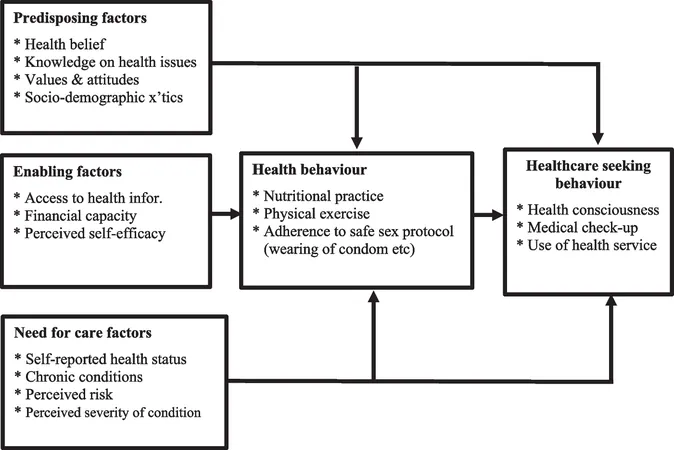
Unveiling the Hidden Struggles: Female Sex Workers' Experiences and Health-Seeking Behaviors in Low-Middle Income Countries
2024-10-09
Author: Daniel
The topic of female transactional sex workers is gaining increasing attention as societies grapple with the challenges posed by public health issues associated with sex work globally. Female sex work encompasses a broad spectrum of practices, where sexual services are exchanged for various kinds of compensation, be it money or goods. This definition not only recognizes women's agency in the sex industry but also reflects on the complex socioeconomic, legal, and cultural influences surrounding their lives.
In low- and middle-income countries (LMICs), women largely engage in transactional sex as a means of economic survival, driven by overwhelming socio-economic instability including poverty, gender inequality, and limited access to education. Research shows that many female sex workers (FSWs) face a disproportionate risk of health issues, including sexually transmitted infections (STIs), mental health conditions, and violence. A systematic review indicates that around 21% of FSWs report suffering from anxiety, and nearly 42% face depression.
The stigmatization and legal complications surrounding sex work exacerbate the vulnerabilities faced by FSWs. Studies report that these women often encounter brutal realities such as violence from clients and police actions. The criminalization of their work only adds to their struggles, making healthcare access even more elusive. Interestingly, environments where FSWs operate—rural versus urban—provide drastically different experiences. Urban centers may present greater competition and violence, but they also offer better access to clients and healthcare services.
In Uganda, for example, qualitative research highlights unique experiences of FSWs who navigate client meetings both online and in physical spaces, facing risks like extortion and threats to their cyber security. Factors influencing health-seeking behaviors among FSWs often correlate with the presence—or absence—of local law enforcement, with documented instances where increased police presence leads to higher rates of violence against these women.
The complexities of health-seeking behavior underscore the broader implications of societal norms, access to healthcare, and individual circumstances. Many FSWs avoid public healthcare facilities due to fears of stigma, discrimination, and mistreatment—up to 70% reportedly refrain from seeking care in these environments. Instead, they tend to favor informal healthcare providers who are perceived as more understanding and accessible, leading to a reliance on community health services over formal avenues.
Moreover, educational levels, socio-economic status, and personal health awareness all play crucial roles in FSWs’ health-seeking behaviors. Women with higher educational attainment typically have a better understanding of health issues and available resources. However, the transition into sex work often bypasses the need for medical screening and health services, particularly in cases where clients refuse to use condoms, compromising their health in a series of dangerously unprotected encounters.
The healthcare landscape for FSWs in LMICs has seen some positive variations, with community health education initiatives enhancing service utilization. For instance, in regions like São Paulo, tailored health education programs have increased access to preventive health measures for FSWs. Yet, barriers still construct a daunting wall against full healthcare utilization, including oppressive cultural norms and fear of victimization.
This scoping review draws on Anderson’s Model of Health Services Utilization to illuminate the health-seeking behaviors of FSWs in LMICs. It emphasizes the interplay of predisposing, enabling, and need-based factors that shape access to healthcare services. The result is a compelling call to action for healthcare policymakers, community leaders, and public health advocates to prioritize the health and wellbeing of female sex workers while challenging the stigmas that surround their work.
Ultimately, while this study highlights the dire realities faced by female sex workers—ranging from socio-economic challenges to pervasive health risks—it also calls for comprehensive strategies aimed at empowering these women through improved legal protections, targeted health services, and a societal shift in perceptions towards sex work. Time is of the essence in framing policies that genuinely address the needs of female sex workers, eradicate violence and discrimination, and facilitate pathways to safer health practices. The health of sex workers is not only an individual concern but a pressing public health issue that, if unaddressed, poses risks to communities at large.


 Brasil (PT)
Brasil (PT)
 Canada (EN)
Canada (EN)
 Chile (ES)
Chile (ES)
 España (ES)
España (ES)
 France (FR)
France (FR)
 Hong Kong (EN)
Hong Kong (EN)
 Italia (IT)
Italia (IT)
 日本 (JA)
日本 (JA)
 Magyarország (HU)
Magyarország (HU)
 Norge (NO)
Norge (NO)
 Polska (PL)
Polska (PL)
 Schweiz (DE)
Schweiz (DE)
 Singapore (EN)
Singapore (EN)
 Sverige (SV)
Sverige (SV)
 Suomi (FI)
Suomi (FI)
 Türkiye (TR)
Türkiye (TR)